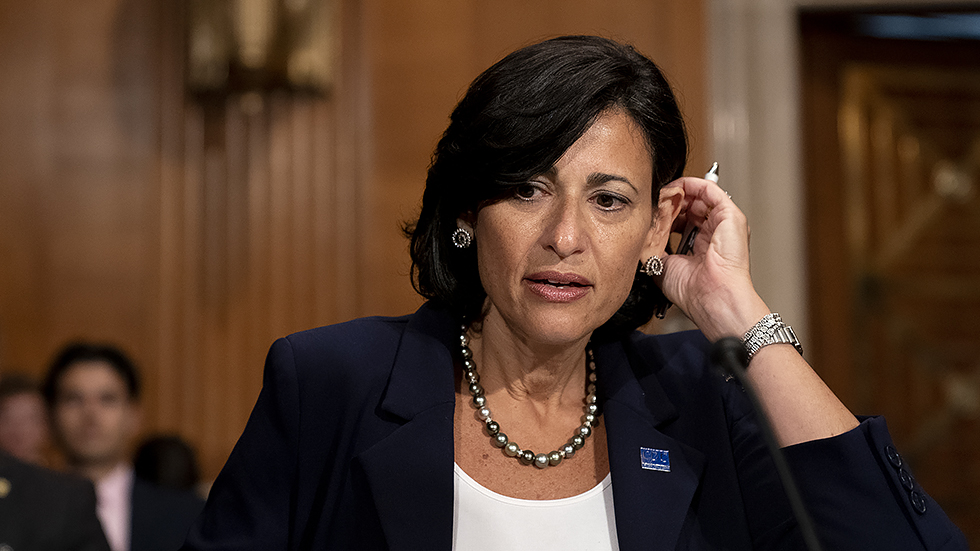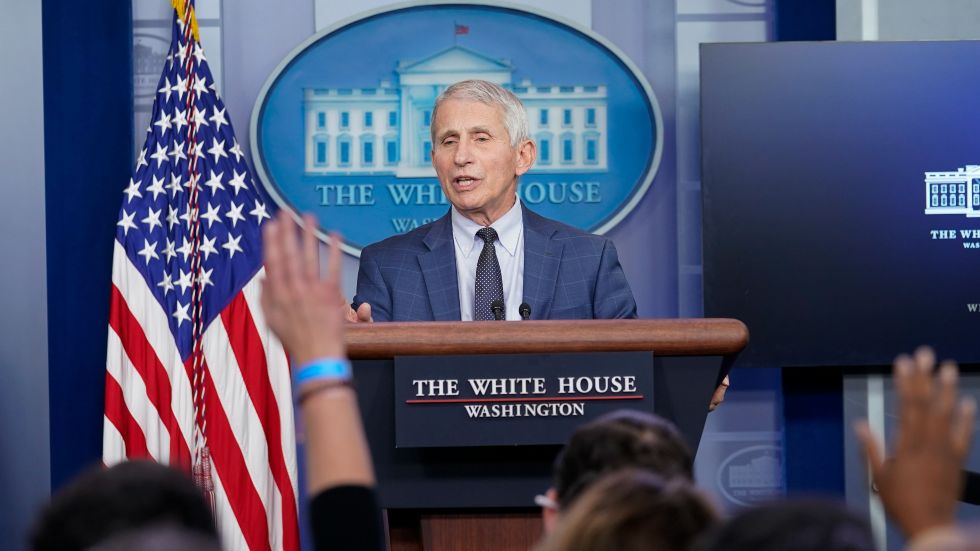Overnight Health Care — White House under pressure over masks
Welcome to Wednesday’s Overnight Health Care, where we’re following the latest moves on policy and news affecting your health. Subscribe here: digital-stage.thehill.com/newsletter-signup.
It was inevitable that internet influencers would bring together two of the biggest cultural events of the past year: COVID-19 and Encanto.
The White House and CDC think it’s too soon to lift mask requirements, but risk being left behind as Democratic-run states do it anyway.
For The Hill, we’re Peter Sullivan (psullivan@digital-stage.thehill.com) and Nathaniel Weixel (nweixel@digital-stage.thehill.com). Write to us with tips and feedback, and follow us on Twitter: @PeterSullivan4 and @NateWeixel
Let’s get started.
Officials face new pressure to lift mask rules

The White House is facing pressure to revise its position on wearing masks, as declining COVID-19 cases and pandemic fatigue among voters leads an increasing number of Democratic states to lift requirements on public masking.
Some governors and local health officials are calling for the White House and Centers for Disease Control and Prevention to release guidance for an off-ramp for mask usage.
Mask requirements are one of the only remaining COVID-19 restrictions in place in many areas of the country. But agency director Rochelle Walensky is insistent that it’s not yet time to lift mask requirements anywhere.
The consequences: Public health experts said the administration risks losing credibility as more and more states go at it alone.
“No one is expecting the CDC to say that mask mandates need to end overnight. But where are the metrics for when restrictions can be lifted? With each passing day, the CDC is making itself less relevant, not only for COVID-19, but for other public health matters as well,” said Leana Wen, a professor of health policy and management at George Washington University.
Politics too: The decisions states are making are just as political as they are scientific, and Democratic strategists said the Biden administration should recognize that. For example, New Jersey Gov. Phil Murphy barely won reelection in November against Republican Jack Ciattarelli, as many voters in the state disapproved of his COVID policies during the pandemic.
Murphy this week said the state’s mask mandate in schools will be ended next month.
CDC advises against ending mask mandates

The head of the Centers for Disease Control and Prevention (CDC) said the agency is still not ready to make recommendations on relaxing mask requirements, even as more governors announce their intentions to do so.
“We are working on that guidance,” Rochelle Walensky told reporters during a White House briefing, but “our hospitalizations are still high, our death rates are still high. So as we work towards that and as we are encouraged by the current trends, we are not there yet.”
Her comments come as a growing number of states, like California, Delaware and New York announced this week their intentions to drop indoor mask mandates in the coming days. Some others, like Connecticut, Massachusetts and New Jersey, are eliminating mask mandates in schools.
Walensky noted that decisions on masks should be made at the local level based on local metrics, like hospital capacity, transmission rate and vaccinations. While numbers are trending downward, she said there’s still too much viral transmission.
“At this time, we continue to recommend masking in areas of high-end substantial transmission. That’s much of the country right now in public indoor settings,” Walensky said.
According to the CDC, 99 percent of U.S. counties still have high levels of coronavirus transmission.
NEW YORK LIFTING INDOOR MASK MANDATE
New York Gov. Kathy Hochul (D) announced at a COVID-19 briefing on Wednesday that the state’s indoor mask mandate and vaccine requirements will be lifted, but mask mandates in schools will remain.
Hochul said decisions whether to keep indoor mask mandates or vaccine requirements will now be up to local governments. On a state level, restaurants and other venues will not have to require masks or check a person’s vaccination status.
Hochul said the mandate will end on Thursday when the emergency order was set to expire anyway.
However, Hochul said after discussions with local leaders and considering the lower vaccination rates among children, the mask mandate for schools will remain in effect for now.
Hochul’s move follows a huge drop in COVID-19 cases in the state after the omicron variant wave hit New York in December and January.
Fauci: US exiting ‘full-blown’ pandemic phase

The U.S. is exiting the “full-blown” pandemic phase of the years-long COVID-19 crisis that began in 2020, the Biden administration’s chief medical adviser Anthony Fauci told the Financial Times on Tuesday.
Fauci, who is the director of the National Institute of Allergy and Infectious Diseases, said that new developments that limit COVID-19, including vaccinations, medical treatments and prior infection, will alter the pandemic situation significantly in the coming months.
“As we get out of the full-blown pandemic phase of COVID-19,” Fauci said to the Times. “Which we are certainly heading out of, these decisions will increasingly be made on a local level rather than centrally decided or mandated. There will also be more people making their own decisions on how they want to deal with the virus.”
Fauci said that he hopes all COVID-19 restrictions will be halted in the coming months as well, citing mandatory mask-wearing as one of the restrictions he expects to end. He agreed that restrictions might end in 2022.
Nonetheless, Fauci warned that local health departments might bring back certain restrictions if regional outbreaks occur.
“There is no way we are going to eradicate this virus,” said Fauci, according to the Times. “But I hope we are looking at a time when we have enough people vaccinated and enough people with protection from previous infection that the COVID restrictions will soon be a thing of the past.”
COVID-19 ‘ISN’T FINISHED WITH US’
Despite declining daily case rates around the world, the World Health Organization’s (WHO) leader encouraged people on Wednesday to remember that “COVID isn’t finished with us.”
“Depending on where you live, it might feel like the COVID-19 pandemic is almost over, or, it might feel like it is at its worst,” WHO Director-General Tedros Adhanom Ghebreyesus said Wednesday.
“But wherever you live, COVID isn’t finished with us,” he added.
Tedros also said that “diseases know no borders,” noting that the rapid uptick in infections that the omicron variant brought showed how “any feeling of safety can change in a moment.”
“We know this virus will continue to evolve, but we are not defenseless,” the WHO leader noted. “We have the tools to prevent this disease, test for it and to treat it. When people have access to those tools, this virus can be brought under control.”
The comments came during opening remarks for the launch of the WHO’s ACT-Accelerator campaign for global equity in COVID-19 tests, treatments, vaccines and personal protective equipment.
They followed the release on Tuesday of the agency’s weekly epidemiological report, which showed that COVID-19 cases across the world declined by 17 percent in the week between Jan. 31 and Feb. 6 when compared with the prior week. During that time period, the agency reported 19 million new cases of COVID-19 and just under 68,000 new deaths.
WHAT WE’RE READING
- Pop-up COVID-19 test sites and labs capitalize on lax regulations, prey on vulnerable Americans (USA Today)
- I’m vaxxed, boosted, and just had Covid-19. Can I relax now? (Vox.com)
- Key U.S.-Canada border crossing blocked by truckers as Covid protest spreads (NBC)
STATE BY STATE
- After four COVID-19 surges, will North Texas’ health care system recover? (Dallas Morning News)
- GOP plan to gut Medicaid advances to floor of Missouri House (St. Louis Post Dispatch)
- ‘Somebody is gonna die’: Medi-Cal patients struggle to fill prescriptions (Kaiser Health News)
OP-EDS IN THE HILL
Why personal choices about COVID-19 vaccines are not always that personal
Omicron’s relentless spread increases the urgency to fund vaccine equity
That’s it for today, thanks for reading. Check out The Hill’s health care page for the latest news and coverage. See you Thursday.
Copyright 2023 Nexstar Media Inc. All rights reserved. This material may not be published, broadcast, rewritten, or redistributed. Regular the hill posts








